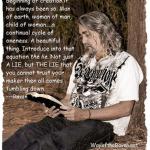Over the centuries, Christians have used the word faith in many different ways. From the texts of the Hebrew Bible and New Testament up through statements of conciliar councils and theologians, there have been numerous understandings of what faith is and how it comes about. Is faith a kind of knowledge, the “evidence” of things hoped for, as St. Paul says? Or is it a kind of trust – in the Bible, the teachings of a church, or in God?... Read more


















